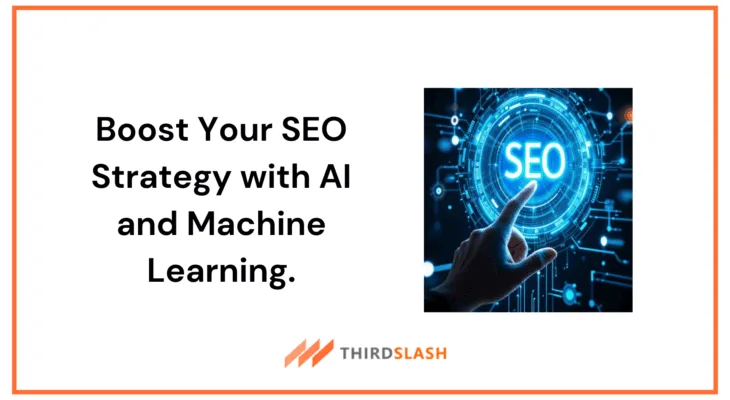Single Blog

How AI and Machine Learning Are Shaping SEO Strategies
- admin
- February 21, 2025
- 0 Comments
Businesses use AI and machine learning now to enhance their SEO efforts and make them work better based on data. These technological innovations have graduated from hype terms to become fundamental tools that guideline online content rankings and online marketing techniques. We need to examine AI and machine learning’s effects on search engine optimization while looking at how they benefit companies who want to lead in their field.
1. Enhanced Search Engine Algorithms
AI technology influences SEO mostly by helping search engines understand user searches better. Google makes use of its RankBrain and BERT algorithms enforced by AI and machine learning technologies to read search intent and text context better. BERT (Bidirectional Encoder Representations from Transformers) brings context understanding to Google searches by telling the search engine which words mean what rather than looking only at keywords. By understanding better how people search online search engines deliver better targeted results allowing companies to focus their content on matching users’ true needs.
2. Improved Content Creation and Optimization
AI technologies help users develop quality content that meets important SEO standards. AI platforms evaluate top-ranked content to recommend topic ideas and keywords for successful performance. These tools examine text elements to evaluate readability and keyword balance while providing insights into content performance against trending data.
Machine learning analyzes audience feedback and adjusts our content strategy to serve what readers want to see. ML systems inspect user interactions to show businesses which content types best engage and convert customers so they can better target their content strategies.
3. Better Keyword Research
Many companies still conduct keyword research by hand but artificial intelligence and machine learning allow us to automate these steps with increased speed and precision. With AI tools like Google Keyword Planner and outside platforms users can detect search keywords that match user demand based on traffic and business competition. Through its advanced analysis machine learning identifies keyword connections that human researchers would miss to find narrower areas of opportunity.
AI tools find keyword patterns in advance to help businesses update their search engine optimization plans when necessary.
4. Personalized User Experience
Modern SEO needs individualized interactions between websites and users which AI helps make possible. Companies use AI to read user actions and preferences so they can deliver the right content and suggestions to people. A tailored user experience both strengthens visitor engagement and demonstrates to search engines your platform delivers useful content and boosts your site’s rankings.
AI recommendation systems help users find products by displaying items they want based on past choices which raises conversion rates for all sites.
5. Voice Search Optimization
Voice search has grown in significance because users now control devices with their voices including smartphones and smart speakers. Voice search technologies run on AI and machine learning systems that let users speak naturally and receive precise online results.
Search engine optimization needs to follow how conversations happen unlike typed search methods. To succeed with voice search businesses must improve their content through natural language processing methods because users speak in flowing dialogue. The technology can predict voice search trends to make content adjustments matching voice query patterns for better voice search ranking.
6. Improved User Behavior Analysis
Machine learning helps businesses better understand how users interact with their websites. ML algorithms examine web performance indicators to assist businesses in improving how users interact with their sites. These data results let businesses update their SEO activities to make user interaction more satisfying.
Through ML analytics tools you can discover what makes users leave specific pages on your site and then use this feedback to fix page loading times or editorial choices.
7. Automated SEO Tasks
Machine learning tools help marketers save time they can dedicate to creating advanced SEO strategies. AI-based systems assist SEO professionals by performing work processes like website checks and backlinks assessment plus keyword research. SEO specialized programs employ machine learning to find market trends and openings that guide our SEO choices with smarter insights than manual assessment methods.
AI tools now find broken links, optimize meta tags and run reporting which makes SEO tasks faster.
8. Predictive SEO
Machine learning’s predictive capablities help businesses develop better SEO tactics. By processing multiple data sources ML systems make accurate predictions about future search patterns and page performance. Businesses can better predict market changes and update their strategies quickly to lead their industry.
Predictive SEO tools can show companies which keyword trends are emerging so they can write articles that will perform better in future search results.
Conclusion
AI and machine learning impact how we do SEO by making the process more productive with better results from data analysis. Through these technologies companies can make their sites perform better while creating high-quality content that enhances user experiences previously unachievable. Enhancements in AI and ML technology require SEO experts to update their knowledge or companies will lose their competitive advantage. Your business growth depends on implementing AI and machine learning into your SEO strategy to remain visible and keep pace with the digital world’s changes.
